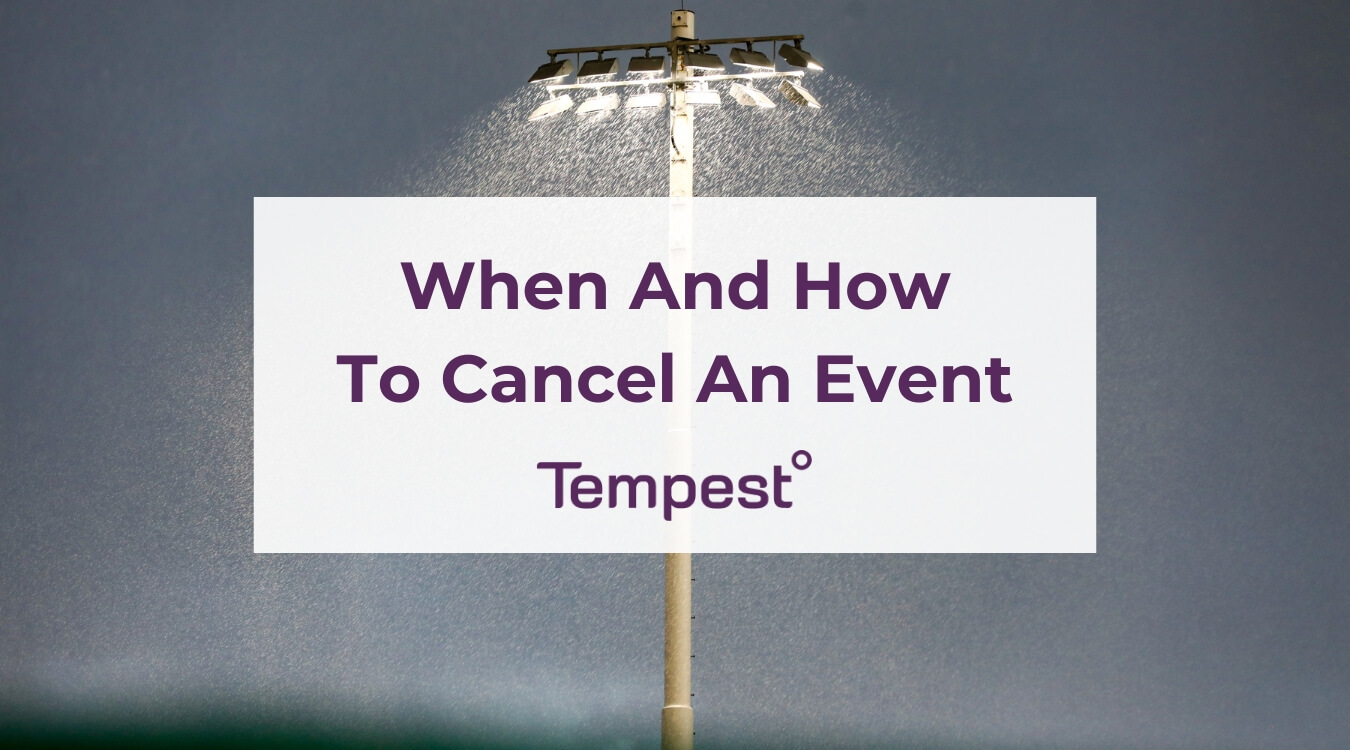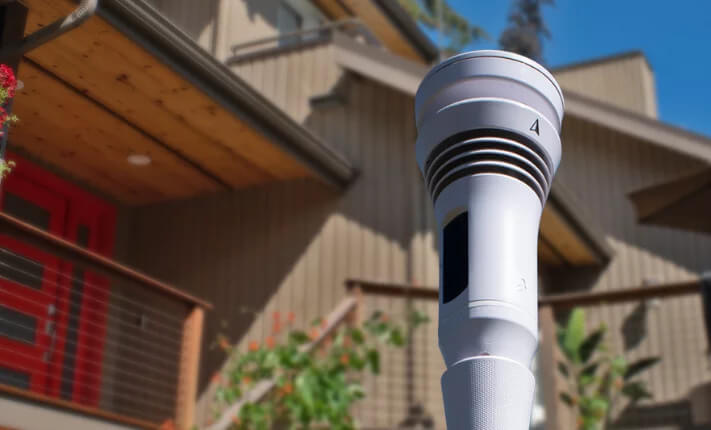
It’s never easy to know when and how to cancel an event. Whether you’re planning a concert, a local fundraiser, or a corporate retreat, a great deal of effort goes into making everything run smoothly.
That’s why it’s important to have a plan in place just in case things don’t go as expected. In this guide, you’ll learn how to cancel an event, what to say in your announcements, and how to handle the logistics. We’ll also include event cancellation announcement examples and tips on event cancellation wording to help you communicate clearly and professionally, especially when your event is cancelled due to weather or other unexpected circumstances.
- Reasons For The Cancellation Of An Event
- When Should You Send Out An Event Cancelled Message?
- How To Cancel An Event
- Event Cancellation Wording Tips
- Event Cancellation Announcement Examples
The Tempest Weather System is a personal weather station that sends hyper-accurate local weather information to your phone, helping you make an event cancellation decision easier.
Reasons For The Cancellation Of An Event
There are a variety of reasons why you may need to cancel an event. Sometimes, the decision is out of your hands. Whether it’s extreme weather or a last-minute venue issue, knowing the most common causes for cancellation can help you plan ahead and minimize disruption.
Severe Weather Conditions
Bad weather is one of the most common reasons for outdoor events to be cancelled. From lightning and hurricanes to extreme heat or wildfire smoke, weather-related cancellations protect the health and safety of guests, staff, and vendors. If you’re planning an outdoor event, it’s critical to understand the typical weather patterns for that time of year. Always have a contingency plan in place, such as an indoor backup venue or a flexible schedule, in case forecasts take a turn.
Low Ticket Sales Or Attendance
While it may feel disappointing or even awkward, sometimes an event is cancelled because of low ticket sales or RSVPs. Beyond financial concerns, low attendance can reduce the energy and engagement at an event, potentially leading to a negative experience for those who do attend. Setting a minimum benchmark for ticket sales or participation ahead of time can help you make a clear and timely decision if that mark isn’t reached.
Performer Or Speaker Cancellations
When a headliner, keynote speaker, or featured guest pulls out at the last minute, it can leave a significant gap in your program, especially if they’re the main attraction. While some events can proceed with a revised schedule or substitute speaker, others may need to be rescheduled or called off entirely. Having backup options lined up or maintaining flexible contracts with presenters can make it easier to adapt.
Venue Or Technical Issues
Even the best-planned events can hit a wall if the venue suddenly becomes unavailable. Power outages, flooding, scheduling conflicts, or safety hazards at the site can force a cancellation. Technical issues, such as lighting problems, sound system failures, or streaming errors, can also make the event impossible to run effectively. If the event is small, a backup location might be feasible. For larger events, identify potential technical risks early and build in safeguards.
Health And Safety Concerns
Protecting the health and safety of everyone involved should always be a top priority. Whether it’s a public health emergency, illness among staff, or issues related to crowd control or sanitation, some circumstances may make it irresponsible or even illegal to move forward. Following local health regulations and building emergency protocols into your planning can help you manage these situations if they arise.
When Should You Send Out An Event Cancelled Message?
Once the decision is made, communicate it right away. Ideally, you should notify attendees within 24 hours of the decision to cancel the event. The earlier you reach out, the better your chances of maintaining trust and reducing confusion. If the event is postponed instead of fully cancelled, prompt communication can also boost attendance for the new date.
For events that are cancelled due to weather, time is especially critical. Attendees may need to change travel plans or prepare for alternate conditions. Transparency and urgency can go a long way in keeping your audience on your side.
Do you need to cancel an event due to severe weather? Learn how to best prepare for bad weather in our guide.
How To Cancel An Event
The cancellation of an event is more than just sending out a cancellation notice. It involves several key steps to make sure everyone affected is informed, logistics are adjusted, and financial and legal obligations are handled responsibly.
Review Contracts And Policies
Before you move forward, take time to review all contracts, vendor agreements, and insurance policies. Many of these include cancellation clauses that explain your responsibilities and protections. If the event is cancelled due to weather or another uncontrollable factor, certain penalties may be waived.
Understanding the legal and financial implications of cancellation will help you make an informed decision and manage your risk.
Make The Final Cancellation Decision Promptly
Whether you’re deciding weeks in advance or the day before, act quickly once you’ve weighed your options. Delaying the decision can lead to greater costs and complications, especially if vendors need to be released or guests need to be refunded. Trust your contingency planning and act with confidence when it’s time to cancel the event.
Notify Stakeholders And Attendees Immediately
Once the decision is final, notify all key stakeholders. This includes vendors, sponsors, performers, volunteers, and staff. These groups are central to the event and need time to adjust their plans.
Next, send an event cancellation email or notification to attendees. Be empathetic, direct, and honest in your messaging. Make sure everyone understands the reason for the cancellation and what steps are being taken next, whether that’s issuing refunds, offering credits, or rescheduling the event.
Update Event Pages And Marketing Channels
Don’t forget to update your event website, ticketing platforms, and social media accounts. Keep messaging consistent across all platforms to avoid confusion. If the event was cancelled due to weather, make that clear in the title or subtitle of your updates so attendees can immediately understand the context.
Clarity helps reduce the volume of questions coming your way and shows that you are handling the situation responsibly.
Manage Refunds, Rescheduling, Or Alternatives
If the event is cancelled, you’ll need to address refund policies clearly. If the event was advertised as non-refundable, it’s still a good idea to offer alternative options, such as partial credit, discounted future events, or bonus materials for registered attendees.
If the event is rescheduled, be transparent about the new date and what will change. Offer attendees the option to carry their tickets forward or request a refund.
Event Cancellation Wording Tips
Crafting an event cancellation announcement requires a careful tone. Your message should be professional, thoughtful, and informative.
Here are a few tips to help guide your messaging:
- Be clear and empathetic. Explain the reason for cancellation without over-explaining.
- Use simple, professional language. Avoid jargon or vague phrasing.
- Offer next steps, including refund information or updates on rescheduling.
- Acknowledge and apologize for any inconvenience. Let attendees know their support is appreciated.
Avoid leaving attendees with more questions than answers. A well-worded message can make all the difference.
Event Cancellation Announcement Examples
Here are two sample templates you can adapt for your own announcements:
Event Cancellation Email Example:
Subject Line: [Event Name] Cancelled Due to [Reason]
Body:
Dear [Attendee Name],
We regret to inform you that [Event Name], originally scheduled for [Date], has been cancelled due to [reason]. [Brief explanation of reason for cancellation]
All ticket holders will receive a full refund within the next 7–10 business days. If you have any questions, feel free to reach out to us at [Contact information].
We understand this is disappointing, and we appreciate your understanding. We hope to see you at a future event soon.
Sincerely,
[Your Name / Organization]Event Cancellation Social Media Example:
We’re sad to announce that [Event Name] on [date] has been cancelled due to [reason]. We want to thank you all for your support. Refunds will be issued automatically. Stay tuned for updates on when it will be rescheduled.
Get Accurate Local Weather Readings With The Tempest Weather System
Cancelling an event is never fun. Everyone involved, from event organizers to attendees, puts in time, energy, and excitement. But with the right preparation, you can handle it with professionalism and minimize the fallout.
If you frequently host outdoor events, staying ahead of the weather is essential. The Tempest Weather System is a personal weather station that delivers local readings for your area. With accurate data on rain, temperature, wind, lightning, and humidity, you’ll have the insight you need to make better decisions, especially when planning around weather risks.

